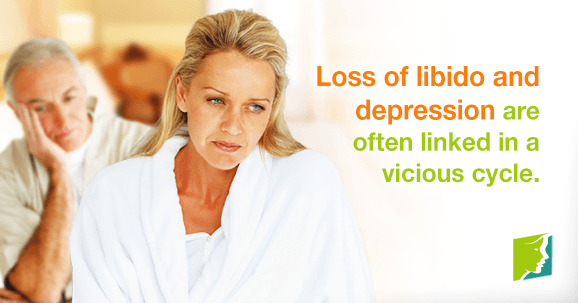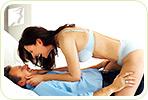Loss of libido and depression are both very common during menopause. Loss of libido can make it extremely difficult to become aroused, and nearly impossible to reach an orgasm. Depression can trigger feelings of worthlessness and hopelessness. Not only can these get in the way of your own happiness and satisfaction with life, it can harm your relationship with your spouse. Fortunately, by knowing more about these conditions, you can find the help you need in order to get your life back.
How Do They Relate?
Loss of Libido can cause depression, and depression can cause loss of libido. They're both linked in a vicious cycle that is often hard to break. If you're depressed, you may lose self-esteem or be too upset to become aroused, or you won't have the emotional energy necessary. On the other hand, if you find you can't perform sexually, it can make you feel frustrated and embarrassed.
This can negatively impact your relationship with your partner, which can further discourage you from having sex.
Causes
Loss of libido and depression are primarily hormonal. During menopause, your estrogen and testosterone levels decrease, which are essential for both mood and sexual functionality. Estrogen works by increasing blood flow and circulation to the sex organs, providing adequate lubrication to the vaginal walls. Also, testosterone gives you the desire for sex in general, and sustains that desire to the point of orgasm.
Estrogen is also directly linked to your brain chemistry. When the levels drop, your levels of serotonin and endorphins can also drop - leading to depression. These symptoms can also be effected by lifestyle.
Lifestyle Solutions
Many lifestyle choices can worsen your depression and loss of libido symptoms. A sedentary lifestyle is one of the most important factors for decreased mood and sexual performance. Make sure to get 3 hours of cardio per week to help increase circulation to your brain and sex organs. It will also increase serotonin levels, which can improve your mood and increase your sex drive.
Also, make sure you have no nutritional deficiencies via a blood test. Eat plenty of whole grains, fruit, nuts, colorful veggies, and lean proteins. Aphrodisiacs like garlic and figs are also great.
Herbal Remedies
There are many herbs available for menopause symptom management, including loss of libido and depression. If you are feeling sad you can get St- John's Wort tea or another herbal supplement to improve your mood. Also, for boosted estrogen levels, try phytoestrogenic herbs, such as black cohosh or dong quai.
Although loss of libido and depression is upsetting, there are ways to fight back. Although you cannot avoid some sort of sexual change during menopause, you can minimize it by exercise, foods, and herbs. By knowing more about the causes of loss of libido and depression during menopause, you can take back control of your life.
Sources
- National Institutes of Health. (2013). Menopause. Retrieved April 3, 2014, from http://www.betterhealth.vic.gov.au/bhcv2/bhcarticles.nsf/pages/Menopause?open
- National Institutes of Health. (2008). Black Cohosh. Retrieved April 3, 2014, from http://ods.od.nih.gov/factsheets/BlackCohosh-HealthProfessional/
- National Institutes of Health. (2013). Physical Activity. Retrieved April 3, 2014, from http://www.nlm.nih.gov/medlineplus/ency/article/001941.htm




